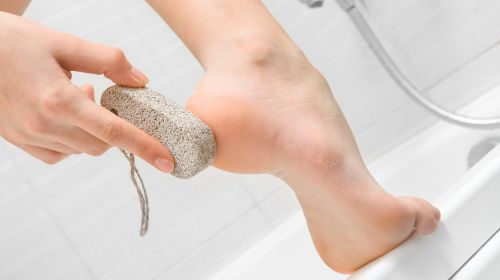Sweaty feet are a problem that many people are familiar with. Men are affected more often than women. Foot odor can have several causes. Foot sweat is usually odorless at first. It is only when bacteria break down the sweat that it begins to smell. Read here which home remedies and tips can help.
- © Getty Images/DigiClicks
Quick overview: Frequently asked questions and answers
What causes sweaty feet? Sweaty feet are caused by an overactive sweat gland on the feet. Reasons can be heat, stress or a genetic predisposition.
What can you do about sweaty feet? Those affected should wash their feet regularly. Breathable socks and shoes as well as foot powder or deodorants can also help to reduce the smell. Some sufferers also use home remedies such as foot baths with sage or vinegar and tea tree oil.
When should you see a doctor about sweaty feet? If sweating is excessive and no home remedies or over-the-counter products help, medical advice should be sought to rule out possible underlying diseases.
At a glance:
What are sweaty feet?
Sweaty feet (hyperhidrosis pedum) are particularly unpleasant when you have to take off your shoes. But smelly feet are also a problem for sufferers in summer.
It is completely normal for feet to sweat. There are more sweat glands on the soles of the feet than on the rest of the body. The film of moisture on the feet gives better grip. In some people, however, the glands produce excessive amounts of fluid.
Sweat, including foot sweat, is usually odorless at first. When bacteria break down the sweat, butyric acid is produced, which causes a foul smell.
The development of odor is not the only problem for people with sweaty feet. The persistent moisture causes the skin to swell and become more sensitive. This environment promotes the development of athlete’s foot and nail fungus.
Sweaty feet: causes and treatment
Airtight shoes and socks made of certain synthetic materials cause feet to sweat more easily and consequently cause foot odor
Excessive sweat production can also be caused by
- hormonal changes,
- Hormonal disorders or
- taking various medications
Mental illnesses such as anxiety disorders can in some cases lead not only to sweaty hands but also to sweaty feet.
Pathological sweating of the feet
There is also abnormal sweating of the feet (hyperhidrosis pedis). The disease usually first appears between the ages of six and 16.
Heavy sweating (hyperhidrosis) or a strong odor on the feet can also be caused by diseases such as diabetes mellitus or an underactive thyroid (hypothyroidism). If in doubt, medical advice should be sought.
Therapy for pathological sweaty feet
In cases of hyperhidrosis without a physical cause, tap water iontophoresis can be used to treat sweaty feet. The feet are placed in a bath of tap water through which a weak current is passed. This causes a slight tingling sensation.
An alternative is treatment with 30 percent aluminum chloride hexahydrate or, in severe cases, interrupting the nerve pathways by injecting botulinum toxin (Botox). However, according to experts, the benefit of this treatment is unclear because there are no relevant studies.
What helps? Care for sweaty feet
However, in cases of less severe symptoms, changes in care and daily routine as well as home remedies can also provide relief.
Since sweat is the basis for the unpleasant smell, the best way to prevent it is to prevent excessive sweating of the feet. The following tips can help against sweaty feet:
-
Maintain good foot hygieneIf you sweat a lot, you should wash your feet daily (several times if necessary) and then dry them thoroughly, especially the toes and the spaces between the toes. Good foot care means that fungi and bacteria will not settle as quickly.
-
Prefer natural materialsSweaty feet develop particularly quickly in shoes made of plastic and synthetic socks. Those affected should wear breathable shoes made of natural materials such as leather, linen or cotton. Some people also wear socks with silver threads incorporated into them.
-
Use deodorant and disinfectant: Foot deodorant in the form of a spray or powder also helps with antiperspirant, antibacterial agents. Special shoe disinfectants that are regularly sprayed into shoes make it harder for bacteria to spread and thus prevent the development of foot odor.
-
Use insoles: Charcoal insoles in shoes absorb sweat and foot odor. Leather or cedar wood insoles are also helpful. They should be changed regularly.
-
Wear open shoes: If possible, wear open shoes such as sandals or flip-flops and walk barefoot as much as possible.
Home remedies for sweaty feet
There are some home remedies that can be tried to combat sweaty feet and sweat odor:
-
Aluminiumchlorid: Bathe your feet more often in water with bath additives containing aluminum chloride. These have an antibacterial effect and thus prevent foot odor.
-
Chamomile extract: Chamomile extracts in the foot bath also have an antibacterial effect, while additives made from oak bark have a drying effect.
-
Relaxation exercises: Use relaxation training to combat stress or psychological strain that can cause excessive sweating.
-
Foot baths: Foot baths with apple cider vinegar, sage, oak bark and juniper extract relax and disinfect. One to two tablespoons of salt or a few drops of tea tree oil in lukewarm water have a similar effect.
-
Lavender oil: Lavender oil has an antibacterial effect. Apply a few drops to your feet in the evening before going to bed and massage in.
-
Baking soda: Add two tablespoons of baking soda to a foot bath or add some baking soda to your shoes before putting them on.
Source: www.lifeline.de




